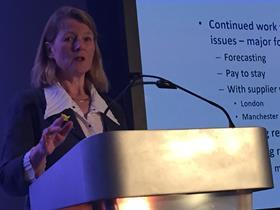
The groceries code adjudicator has reported encouraging progress in supplier-retailer relationships, with the number of reported code breaches in steady decline since the role was created in 2013.
Christine Tacon said the proportion of suppliers to have complained about a retailer potentially breaching the code has fallen almost 20 per cent from 79 per cent to 62 per cent since 2014 – her first full year in the newly-created position.
“Every year since I started I have run a survey [of grocery suppliers],” she told delegates at the TasteWales conference in Newport. “I am seeing a significant change in culture.
“I keep saying to the retailers: ‘When I tell you about something I think is going on, I don’t want you to simply find out who it was and fire them; I want you to think about the culture in the business that allowed this to happen.”
For three years running Aldi has come top for code compliance in Tacon’s survey – an achievement the retailer has highlighted in its advertising.
Progress has also being made by other retailers, with some 29 per cent of Iceland suppliers and 65 per cent of Tesco suppliers saying the retailers had improved in their dealings with them. One unnamed
The improvement in Tesco's reputation with suppliers follows a 2015 investigation by the adjudicator into allegations the retailer breached the industry code of practice by delaying payments to suppliers and demanding extra fees.
In the resultant GCA report, Tacon recommended that Tesco must not make unilateral deductions and must resolve any data input errors identified by suppliers within seven days.
More generally, however, the adjudicator has been encouraged by suppliers’ increased willingness to open up to her about their relationships with retailers – a change she believes demonstrates greater understanding of the code, which was only been in law for seven years.
“Generally, the people that talk to me are raising real code issues,” she said. “They have understood the code and they are raising genuine things.”
Among the issues currently prioritised by the adjudicator are forecasting (of sales and consumer behaviour) and pay-to-stay payments. Under the code a retailer must fully compensate a supplier for any cost they incur as a result of a forecasting error. This applies unless the retailer has “prepared those forecasts in good faith and with due care”.
In March last year Tacon published a best practice statement asking retailers to consider improving transparency of communications with suppliers about forecasting. So far, however, suppliers have reported limited progress towards this goal.
Another emerging issue, according to the adjudicator, is that some suppliers are being asked to pay lump sums to keep their business with a retailer – a requirement that is not part of normal commercial negotiations.
The Groceries Supply Code of Practice, which covers direct suppliers to all the UK’s major retailers, regulates the changing of supply agreements, payments of various kinds, the funding of in-store promotions and other duties, such as consumer complaints. Importantly, however, it does not intervene in disputes over price.
Tacon is in the currently in the process of conducting her 2017 Groceries Sector Survey. Suppliers can complete it online here until 17 April.



